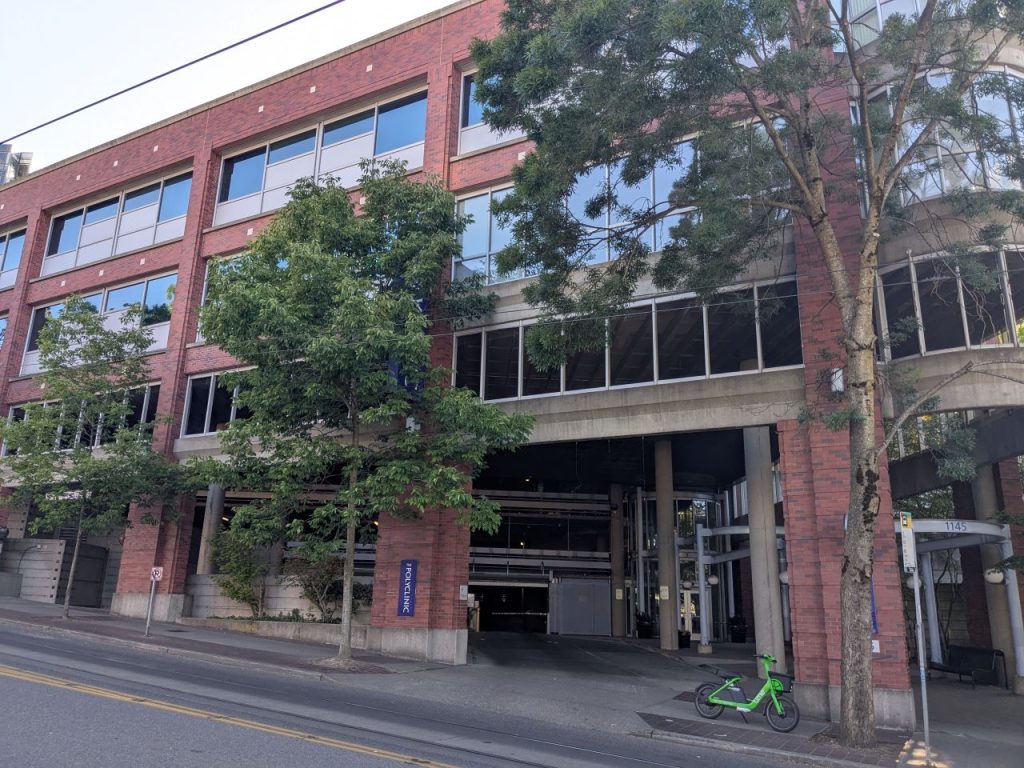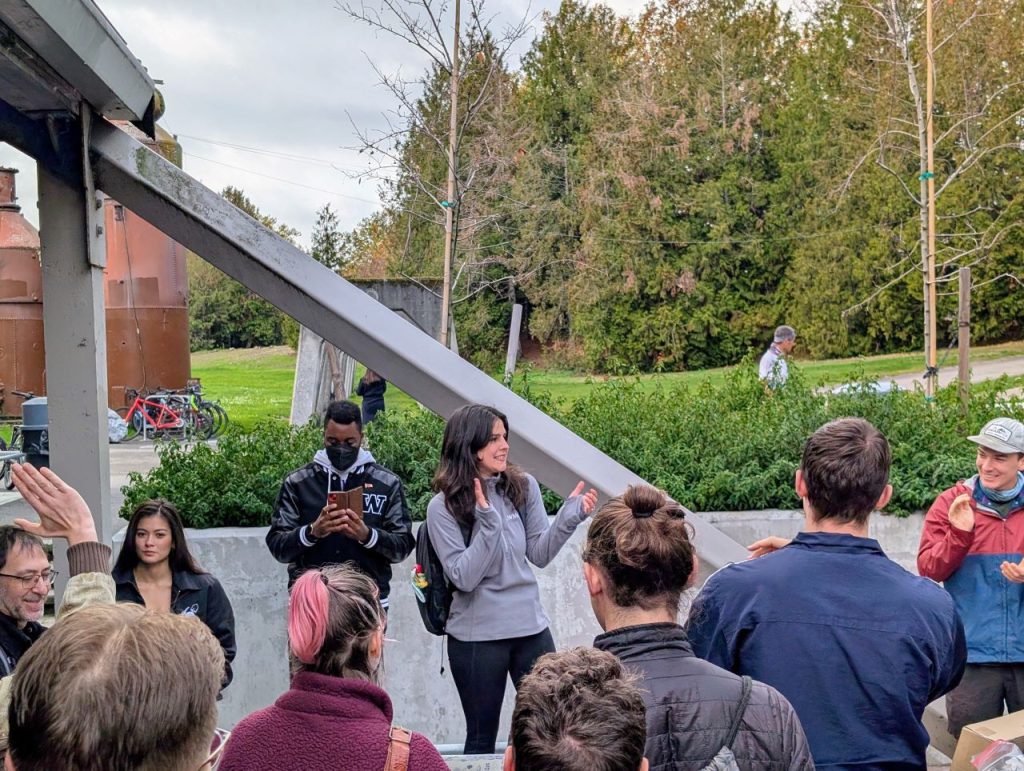
On Monday, Rep. Shaun Scott hosted a town hall in support of opening a crisis care center in Capitol Hill, despite local pushback.
Battle lines are forming as King County works through the process of potentially locating a 24/7 walk-in mental health crisis center in the heart of Capitol Hill. A group of local business owners and residents have criticized the plan, but service providers have underscored the need, and Seattle City Councilmember Alexis Mercedes Rinck has emerged as a vocal proponent.
Seattle Mayor Bruce Harrell has yet to throw his weight behind the Capitol Hill center, instead deferring to the County. Meanwhile, Councilmember Joy Hollingsworth — who represents District 3, where the new center would be located — has elevated the concerns of opponents and urged the County to add more process before moving forward with the proposed site at Broadway and Union Street.
Harrell is toeing a fine line as he faces a reelection fight. His top challenger, Katie Wilson told The Urbanist she supports the proposed Capitol Hill crisis center, and she has made improving the social safety net a top priority in her campaign.
King County voters passed the crisis care center levy in November of 2023 by a wide margin, 57% to 43%. The levy raised the county’s property taxes in order to fund the creation of five behavioral health crisis care centers that anyone can visit without worrying about how to pay for their care. Designed to address people’s behavioral health needs including substance use disorder, the centers will be geographically spread throughout King County. One center will be focused on serving the mental health needs of the region’s youth.
“The crisis care centers levy was passed back in 2023, really as a response to the recognition that when you break your arm, you know where to go,” said Kelly Rider, the director of the King County Department of Community and Human Services (DCHS). “When you have a behavioral health crisis right now, we have no place where you can just walk in and have anything supported, whether it be day or night, whether you are suffering and struggling with suicidal thoughts or depression, or whether it’s your friend or family member or even somebody that you’re working with.”
The centers are designed to contain three different levels of care. Each center will have a walk-in urgent care clinic that can screen and triage people to connect them to the appropriate care and services. This clinic can perform an assortment of services including helping people find long-term psychiatric providers and providing bridge scripting for people who are having trouble accessing their prescribed medications.
Each center will include a 23-hour observation lounge, which serves as an alternative to an emergency room. And for patients with more acute needs, each center will also contain a short-term stabilization unit where people can stay for up to 14 days.
Earlier this year, Connections Kirkland was selected as King County’s first official crisis care center, covering the North King County geographical zone.
In January, King County entered into a purchase and sale agreement for $50 million with the old Polyclinic building in Capitol Hill at the corner of Broadway and Union, near First Hill. This proposed site for the county’s second crisis care center would serve the central region in Seattle proper. If the county goes forward with the deal, it is expected to close by the end of the year.

Rider said their choice ultimately boiled down to this building or building a facility from scratch. The old Polyclinic is centrally located near bus and light rail lines as well as I-5 and I-90, making it easy for people to access and for first responders to do quick patient drop-offs. It’s close to hospitals, which makes logistics easier for patients who need both physical and mental health care. It’s appropriately zoned and already built out as a medical facility, which means it will become operational more quickly.
The new crisis care center could open as early as 2027.
Local debate over the choice of site
Rumors of the proposed Capitol Hill site spread earlier this year, leading to opposition from some residents and local businesses, who sent a letter in April protesting the plan to Seattle Councilmember Joy Hollingsworth, who represents District 3 where the new center would be located.
“We firmly oppose the proposed placement at the Polyclinic building on Broadway,” the letter read. “Capitol Hill and First Hill have reached a saturation point regarding their capacity to manage the impacts associated with drug addiction and mental health crises. The addition of another facility here would exacerbate existing instability in neighborhoods already burdened by frequent violence, rampant drug activity, and severe pressures on local businesses and residents.”
One signatory, Steven Severin, who co-owns Life On Mars, Neumos, Barboza, and the Runaway Bar, took to social media to claim he had never agreed to sign the letter.
Two letters have since circulated expressing support for the proposed location: one by Hannah Krieg, publisher of The Burner, and one by Alex Hudson, a former D3 city council candidate who has rented in the First Hill neighborhood for 17 years. Both letters express the need for this investment in Capitol Hill to interrupt the crisis cycle and provide mental health care for neighbors.
In mid-June, the 43rd Legislative District Democrats passed a resolution in support of the proposed Capitol Hill location for a crisis care center. Their chair, Ryan Driscoll, told The Urbanist that their membership has sent 230 letters in support of the location to local lawmakers so far.
Hollingsworth sent a letter to DCHS’s Rider on May 22, in which she wrote the following: “Over the past six weeks, my office has heard from numerous residents, small business owners, school administrators, and community members expressing concerns about King County’s plan to site a Crisis Care Center at the former Polyclinic building on Broadway. Many have reached out to the City of Seattle to raise concerns about the lack of communication and transparency surrounding this process.”
Hollingsworth went on to ask for four actions: release of the sale agreement timeline; a robust public engagement process led by DCHS; working with the council and Mayor’s Office to “explore and evaluate” multiple potential locations for crisis care centers; and conducting in-person neighborhood visits, including during evening hours, to understand the neighborhood’s activity and meet with stakeholders.
Area hospitals are largely in support of locating a crisis care center in Capitol Hill.
“The crisis centers are a welcome addition to the continuum of care for folks in our community with behavioral health issues,” said Amy Dodgion, who handles behavioral health in acute care with Swedish hospitals. “I feel pretty confident saying that not only Providence Swedish supports this (and the proposed site on Broadway in the old PacMed building) but all area hospitals would support it. As it stands now, hospitals, and especially emergency departments, care for people for whom we cannot provide the right resources.”
Dodgion went on to explain that the crisis care centers will fill a current gap in the health care system for people who are experiencing a behavioral health crisis that isn’t imminently life threatening. She emphasized that the new centers will alleviate some stress from hospital systems.
“The Crisis Centers offer discharge planning and coordination of resources in the community for the people they will see as well – with the concept of bridging them back into some kind of care/treatment/resource in the community, even if you aren’t at imminent risk of harm to self or others (which is what we assess for in the ER),” Dodgion told The Urbanist. “This supports helping people BEFORE their crisis devolves and they fully decompensate, so that hopefully less people will get to the point where they need to come to the ER at all.”
More electeds get involved
Earlier this week, local state legislator Shaun Scott (D-43rd, Seattle) and city-wide Seattle City Councilmember Alexis Mercedes Rinck held a town hall at Vermillion, where the crowd of over 100 people was warmed up by jokes from local political comedian Brett Hamil. Nicole Macri (D-43rd, Seattle), Brianna Thomas (D-34th, West Seattle), and a few local Seattle candidates were also present, as was Rider, who participated in an open Q&A with audience members.

When The Urbanist asked Scott why he’d gotten involved with this issue, he spoke about the collaborative nature of governance and how popular the issue of providing more behavioral health services is, both in his district and across the state.
“For me, the placement of a crisis care center here is building on a long legacy of inclusion in this neighborhood. We are also contending with a long legacy of exclusion here, the fact that we had, you know, at one point in time, racially restrictive covenants that marred much of Capitol Hill,” Scott said. “I’m excited about it, both for the statement that it’s going to make about affirming what Capitol Hill is and what it’s about, but also doing something to push back against that legacy of exclusion, which we have too much of and too many remnants of as well.”
Rinck told The Urbanist how excited she is that these crisis care centers are creating a front door for the behavioral health system, which can be famously hard to navigate.
“There’s the objective fact that there will be a place for people to go when they’re experiencing a behavioral health crisis. That is the literal reality of what we’re trying to do here,” Rinck said. “But I think there’s also the social reality that we are taking steps as a community to take care of people, and I think there’s value in that as well.”
During the town hall, Rinck spoke passionately in favor of the new center, linking this increase in access to behavioral health services to Congress’s recent passage of the federal tax and spending bill that will institute severe cuts to Medicaid, food stamps, and potentially even Medicare.
“This is a frightening moment in American history,” Rinck said. “I don’t know what a Washington without Medicaid looks like. I don’t know what a Seattle looks like with thousands of people that lose their SNAP benefits, and I don’t know what America looks like without any meaningful social safety net. But what I do know is that when the federal government is abandoning their responsibility to take care of people, Seattle and King County is stepping up. We’re going the other direction, because we know our communities are safer when we are all healthy and housed.”
Rider said she’s heard the desire for more engagement loud and clear during the Q&A portion of the town hall.
“The first messages that we got, I think, were: we weren’t doing enough [engagement], and that is because we were really behind the scenes, doing a lot of tests on the building, understanding whether it was actually viable from a kind of cost and building construction perspective,” Rider said. “And now we are trying to do a lot more engagement, both to hear from folks what they need, as well as to answer questions about what it is that we are potentially trying to site here in the neighborhood.”

Two attendees asked questions related to public safety.
“Many of the concerns that people have around public safety are super legitimate because they amount to seeing people who seem like they need some sort of community safety response themselves, so the center could help ameliorate that,” Scott said.
Scott emphasized the importance of meeting people’s basic needs. Rider mentioned that if the old Polyclinic building is turned into a crisis care center, the new use will keep it occupied and vibrant.
“Our ability to really make sure that people get what they need and then get back to wherever they need to be to be most supportive and connected to community makes this a little bit different than many of the other facilities that have been opened across the region,” Rider said.
Next steps
“While I appreciate this level of community engagement, the biggest threat to our community is continued delay,” Hudson said during the Q&A portion of the town hall. “The voters have been very clear that they support this. This is a neighborhood that is in crisis and wants to take care of people, and I’d like to understand what more it is that we are waiting for until we just go ahead and focus on what we really need.”
Rider explained that the county is currently finishing the diligence phase to ensure they want to pursue purchasing the proposed site. DCHS has been involved in a lot of community outreach and dialogue over the last few months and is wrapping up that phase.
Readers who would like to submit input can still do so by emailing CCCLevy@kingcounty.gov.
The county also requires a written demonstration of support from the City of Seattle, although the documentation doesn’t specify who from the City needs to provide this. The Mayor’s Office didn’t respond to The Urbanist’s request for an update on this matter.
Finally, the proposal needs to be put before the King County Council.
“Behavioral health was among the most popular measures that we found voters thought that the state could be investing in,” Scott said. “This would really amount, to me, to a real breakdown in the expression of political will if this were not to happen as a result of elected officials dragging their feet.”
Rider expressed confidence that the county’s plan for the crisis care centers will continue to go forward in spite of the federal cuts to Medicaid, which will cause costs to pencil differently.
“While we continue to need Medicaid to be strong and last week’s vote is disappointing at best, the Crisis Care Center Levy’s reliance on a local tax will continue to make sure that we can keep doors open for folks and continue to open more doors,” Rider said.
In addition to the five centers, the levy is also supposed to pay for creating more residential treatment facilities and supporting the behavioral health workforce. However, the five crisis care centers are the top priority in terms of funding.
The county has a request for proposals for providers with whom to partner on the new crisis care centers that closed for applications just a few weeks ago.
“What I try to offer in all of the conversations I’m having right now in the region on behavioral health is that I do think this is a moment of hope,” Rider said at the town hall. “For decades, we have under-invested and stigmatized the need for behavioral health in our society. […] We have seen over the last several years, I think, folks are more likely to stand up and say, ‘I need behavioral health care’ — and to destigmatize that and demand our government does more for us.”
Update: This article was updated at 3pm Friday with the Wilson statement.
Amy Sundberg is the publisher of Notes from the Emerald City, a weekly newsletter on Seattle politics and policy with a particular focus on public safety, police accountability, and the criminal legal system. She also writes science fiction, fantasy, and horror novels. She is particularly fond of Seattle’s parks, where she can often be found walking her little dog.

